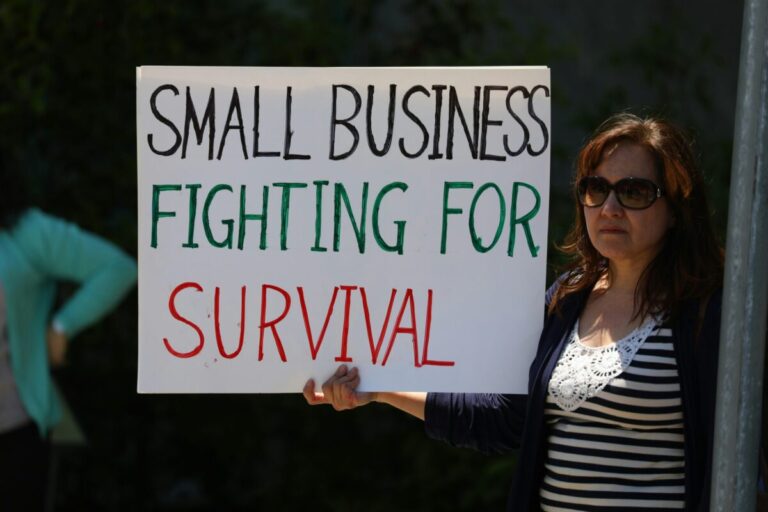A growing grassroots movement, People’s Union USA, has initiated a nationwide economic blackout protest that is rapidly gaining traction across the United States. Launched on February 28, 2025, the protest urges Americans to halt spending at major corporations, instead supporting local small businesses. The movement has quickly drawn attention in light of rising inflation and economic policies critics argue favor large corporations while disproportionately burdening ordinary citizens.
Boycott of Corporations, Support for Local Businesses
The economic blackout aims to shift consumer spending away from big-box retailers, chain restaurants, and gas stations, redirecting funds to small, locally-owned businesses. Organizers of the movement contend that economic policies have favored corporate giants, with soaring costs in essential areas like housing and healthcare leaving everyday Americans struggling to keep up. Meanwhile, large corporations have reported record profits, fueling the growing sentiment of economic injustice.
By refraining from spending at major corporations, the protest seeks to highlight the power of collective consumer action in combating rising economic inequality. The movement calls for a shift in priorities—one that supports small businesses that are often squeezed out by larger retail chains and multinational companies. Many small business owners have reported an uptick in customers in cities where the protest is most active, notably in major metropolitan areas like New York, Los Angeles, and Chicago.
Activism and Community Support
In key cities across the U.S., activists have organized rallies, marches, and community events to raise awareness about the economic disparities perpetuated by the dominance of large corporations. These actions have rallied citizens around issues such as inflation, unaffordable healthcare, and the increasing concentration of wealth among the richest Americans. As protests continue to grow, they have become an important platform for calling on the government to address inflation and to regulate corporate practices that critics say contribute to an unbalanced economy.
Small business owners, who have long struggled to compete with corporate giants, have expressed support for the movement. They argue that local businesses are the backbone of American communities and that a more level playing field is needed to give them a fair chance to thrive. For some, this economic blackout represents not only a call for fairer economic policies but also an opportunity for customers to directly support the communities they live in.
Critics and Concerns About Long-Term Impact
Despite the attention the protest has garnered, critics argue that the economic blackout may not lead to lasting change. Some believe that the movement could inadvertently harm small businesses, many of which rely heavily on local consumer spending and may not be equipped to withstand the fluctuations caused by changes in demand. Furthermore, some critics contend that the protest may be too fragmented to effect significant policy change, particularly given the complexity of the U.S. economic system.
Others question whether a boycott of major corporations will be sufficient to address the root causes of economic inequality. With multinational companies having considerable influence in U.S. politics and a consumer-driven economy reliant on big corporate profits, some argue that the economic blackout, while symbolic, may lack the power to prompt the kind of structural change that supporters hope for.
Symbol of Public Discontent
Despite these concerns, many supporters view the economic blackout as a powerful symbol of growing public dissatisfaction with the economic system. They argue that it shines a light on the widening gap between the wealthy elite and the working class, which has been exacerbated by corporate-driven policies. For those who feel left behind by the political establishment, the protest serves as a way to express their frustration with a system they perceive as rigged against them in favor of big business.
The protest has sparked a larger conversation about income inequality, the rising cost of living, and the future of capitalism in the U.S. As the gap between rich and poor continues to widen, more Americans are questioning the fairness of the economic system. The economic blackout protest has provided an outlet for these frustrations, making it an important part of the ongoing debate about how to fix an economy that many feel no longer works for them.
What’s Next for the Movement?
The People’s Union USA movement is expected to continue into the spring of 2025, with more actions and events planned to raise awareness about the dangers of unchecked corporate power and the need for fairer economic policies. Whether the movement can sustain its momentum and build broader support across the country remains to be seen. However, its growing influence reflects a shift in public consciousness about the role of corporations in American life and the need for change.
As the economic blackout continues, it is clear that the conversation about income inequality and corporate power will remain at the forefront of American politics. Whether or not this protest leads to lasting change, it is likely to be the first of many efforts to challenge the current economic status quo. The People’s Union USA has succeeded in starting an important conversation—one that will likely continue as long as economic disparity remains a pressing issue in the United States.


